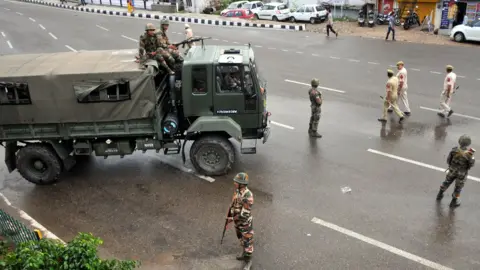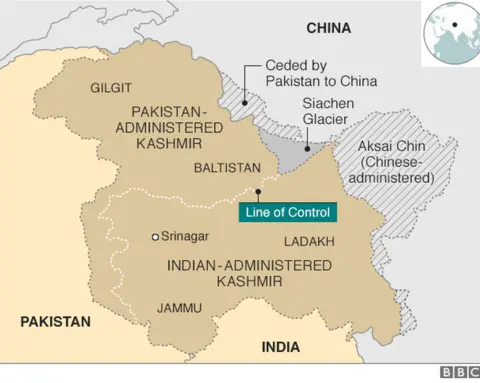Kashmir in lockdown after autonomy scrapped
Indian-administered Kashmir remains locked down a day after it was stripped of a status that gave it significant autonomy from the rest of India.
Telephone networks and the internet, which were cut off on Sunday evening, are yet to be restored and tens of thousands of troops are patrolling the streets.
Instances of protest and stone-throwing have been reported despite the communications blackout and a curfew.
Local leaders have also been detained.
The Himalayan region of Kashmir is claimed in its entirety by both India and Pakistan, but they each control only parts of it.
There is a long-running separatist insurgency on the Indian side, which has led to thousands of deaths over three decades. India accuses Pakistan of supporting insurgents but its neighbour denies this, saying it only gives moral and diplomatic support to Kashmiris who want self-determination.
In his first remarks on the revoked status, Pakistani Prime Minister Imran Khan said what had happened was illegal under international law and that his country could take the issue to UN security council.
"We will fight it at every forum," Mr Khan told parliament on Tuesday. Earlier Pakistan's powerful army chief said his troops stood by Kashmiris in their "just struggle".
What's happening on the ground?
 Getty Images
Getty ImagesThe lockdown in Indian-administered Kashmir is being enforced amid concern that the government's decision to revoke autonomy could trigger large-scale protests by people already unhappy with Indian rule.
The BBC's Aamir Peerzada in Srinagar, who has managed to access one of the few working landlines in the state, said there was a palpable sense of anger and betrayal among people he has spoken to.
One man in Baramulla, he said, "felt that Kashmir had lost its freedom and had been enslaved by India. This is actually the prevailing sentiment. All the decisions were made in Delhi."
Kashmiris in other parts of the country have said that they are unable to get through to their families.
Tens of thousands of additional troops were deployed in what is already one of the world's most militarised zones ahead of the government's announcement on Monday, and more troops have been sent since.
How has Kashmir's status changed?
For many people in Indian-administered Kashmir, Article 370 - as the law guaranteeing special status was known - was the main justification for being a part of India. By revoking it, the Bharaitya Janata Party-led government has irrevocably changed Delhi's relationship with the region, says the BBC's Geeta Pandey.
The article allowed the the Indian state of Jammu and Kashmir a certain amount of autonomy - its own constitution, a separate flag and the freedom to make laws, though foreign affairs, defence and communications remained the preserve of the central government.
It could make its own rules relating to permanent residency, ownership of property and fundamental rights. It could also bar Indians from outside the state from purchasing property or settling there.
The government said Article 370 needed to be scrapped to put the state on the same footing as the rest of India.
But many Kashmiris believe that the BJP ultimately wants to change the demographic character of the Muslim-majority region by allowing non-Kashmiris to buy land there.
What's happening in parliament?
The revocation of special status is currently being debated in the lower house, where a bill relating to the division of Jammu and Kashmir into two distinct regions has been introduced. The state comprises three regions, the Muslim-majority Kashmir valley, Hindu-majority Jammu and Ladakh, which is largely Buddhist.
The bill, which was passed by the upper house on Monday, seeks to split the state into two union territories - Jammu and Kashmir, and Ladakh. Union territories have less autonomy from the federal government than states do.
So the decision to convert Jammu and Kashmir into a union territory is also being seen as an attempt to exercise greater federal control.
This, coupled with the stripping of the state's special status, has drawn sharp criticism from opposition MPs.
Lawmakers from the south, such as those from the DMK party, expressed concern about what they saw as weakening of India's federalism.
Many of them fiercely condemned the move. They accused the government of "denying the will of the people" of Kashmir since the decision to revoke Article 370 was taken without consulting the state's lawmakers.
The critics asked Home Minister Amit Shah where some of the state's leading politicians were, including MP Farooq Abdullah who is not present in parliament. They demanded to know why the house had not been informed ahead of their arrest.
Mr Shah told the house that Mr Abdullah was not being detained, but soon after, Mr Abdullah appeared in an interview with the NDTV news channel, alleging that he had been under house arrest. "Why would I stay inside my house on my own will when my state is being burnt? This is not the India I believe in," the 81-year-old MP said, breaking down as he spoke.
But the opposition is also divided. Several parties, including Delhi's AAP, have backed the decision to revoke Article 370 and bifurcate the state.


